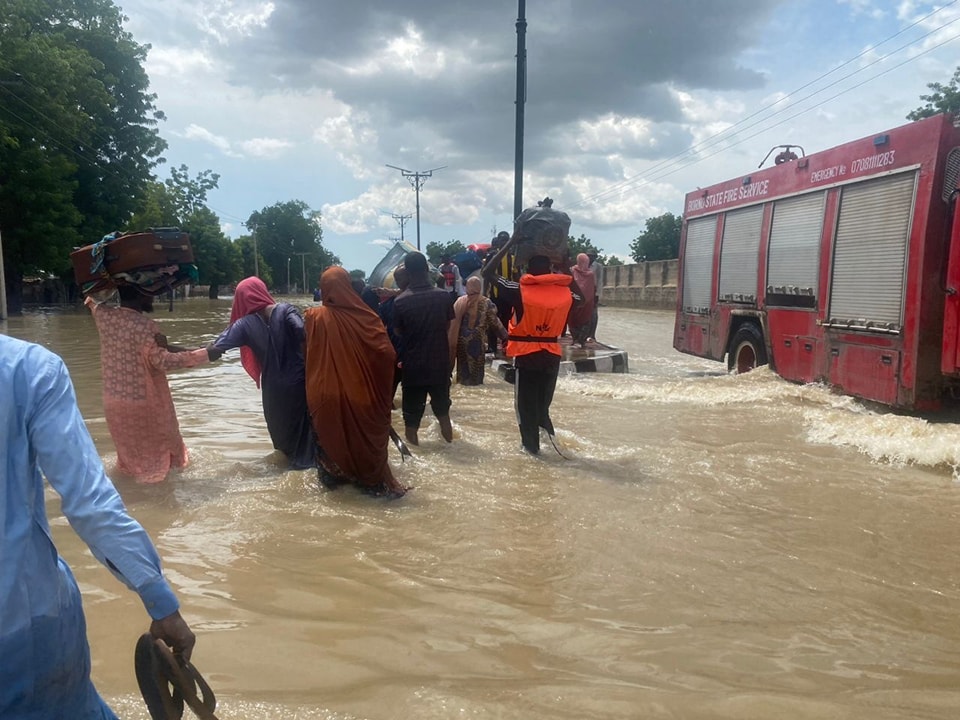

Ongoing floods have led to a crisis in West and Central Africa.
More than four million people have been affected in 14 countries, including over one million in Maiduguri, the capital and biggest city in Borno State, Nigeria. Other affected countries include Cameroon, Chad, Ghana, Liberia, Mali and Niger. At least 1,000 people have died in the rainy season so far, and nearly one million people have been forced to flee their homes.
While this is typically the rainy season in this part of the world, these rains are unusually heavy and, in some cases, the worst floods in 30 years. The rains anticipated to end in September, but new forecasts anticipate ongoing rain through November.
The floods worsened pre-existing conditions in many affected countries, including poverty, hunger and malnutrition, instability, conflict and lack of employment and educational opportunities.
(Photo: Evacuation of stranded flood victims by the emergency response team of Nigeria’s National Emergency Management Agency (NEMA) on Sept. 12, 2024. Credit: NEMA Nigeria via Facebook)
Key facts
- As with many of the world’s recent floods, the disaster stems from climate change. Africa emits the least amount of greenhouse gases, yet the continent is the most vulnerable to the impacts of climate change. The International Rescue Committee says that temperatures in the Central Sahel region of West Africa are rising 50% faster than the global average.
- Children risk a disrupted education for several months v as schools are being used as shelters or were damaged in the flooding. Additionally, the use
addition to affecting children, the loss of schools or other public buildings as shelters creates hardships for people displaced by the floods. - The increase in monsoon rains in west and central Africa is directly connected to the decrease in hurricanes and tropical cyclones in the Atlantic Basin.
- Many areas of the Sahara desert received a year’s worth of rain in just a few months, creating lakes in normally empty basins.
- Floods expose the population to an increase in cholera and malaria outbreaks.
Cameroon
The floods in Cameroon affected the districts of Maga, Kai-Kai, Yagoua and Vele in the country’s Far North region.
Thirty people have died, including four children, and 56,000 houses and 61 health facilities have been damaged.
According to the UNFPA Cameroon Situation Report, “Gender-Based Violence (GBV) safety audits revealed that the floods have significantly increased the risks of GBV, with 78% of key informants reporting a rise in incidents.”
Chad
At least 1.6 million people (roughly 310,000 households) have been affected in Chad since the rains began in July. About 70,000 homes were destroyed, and there have been nearly 500 deaths, the highest in the region.
Floods have affected 117 of the country’s 120 departments, destroying almost 200,000 homes. In addition, nearly 900,000 acres of fields have flooded, and more than 66,000 heads of livestock were killed.
Mali
Approximately 13,000 people are affected in the city of Segou alone.
Overall, nearly 344,000 people in Mali have been affected, including 71,946 children and at least 62 deaths and 118 injuries have been reported. Even before the floods, more than 7.1 million people needed humanitarian aid.
Niger
Since the rains began in May, almost 140,000 people have lost their homes across all eight regions in Niger. At least 400,000 people have been displaced, and nearly 850,000 have been affected (about 95,000 households). There have been about 265 deaths recorded. Thousands of acres of crops have been flooded, which is likely to increase concerns about hunger and cause significant loss of income.
The government reports that 110 classrooms and almost 70,000 homes have been destroyed.
Of the 4.3 million people who needed humanitarian aid before the floods, IRC reports that 3.3 million people are in crisis level of food insecurity or worse.
Nigeria
More than 1.7 million people in 185 local government jurisdictions in Nigeria across 31 states have been impacted by flooding.
At least 200,000 people were displaced, and a million were impacted in Maiduguri alone after the Alau Dam burst on Sept. 10, flooding at least 70% of the city. Experts say that the dam had not received proper maintenance, and at least 300 other dams in the country also need maintenance.
In Borno state, about 640,000 people have been displaced by the flooding this year, including 150,000 children.
The Alau dam breach caused 37 deaths, bringing the total number of deaths for the rainy season to 285 (along with 2,500 injuries). The National Emergency Management Agency said on Sept. 19 that nearly 100,000 homes had been destroyed and more than 315,100 acres of farmland had been washed away because of the flooding. The flooding is expected to severely exacerbate food insecurity.
Many people are isolated in small, rural villages because of the flooding. People need urgent emergency relief support, including medicine, food, clothing, livestock feed, hygiene and dignity kits, temporary shelter materials, and clean water. Some roads remain impassable due to damage or can only be accessed by small vehicles that cannot hold a lot of supplies.
In addition, the UN Population Fund said that women and children comprise the majority of the affected population, adding that sexual and reproductive health services are also needed.
Cash assistance
As with most disasters, experts recommend cash donations, which allow on-the-ground agencies to direct funds to the greatest area of need, support economic recovery and ensure in-kind donation management does not detract from disaster recovery needs.
Many people lost everything in the floods. Direct cash assistance allows families to purchase items and services locally that address their multiple needs. It gives each family flexibility and choice, ensuring that support is relevant and timely. Cash assistance can also help move families faster toward rebuilding their lives.
In some countries, conflict or flooding may limit access to banking operations. For some people, digital banking applications and wallets have become a lifeline. However, not everyone has access to formal banking. In Nigeria, access has grown from 56% in 2022 to 64% in 2023. Lack of cash has led many to utilize digital wallets to cover necessities, pay for travel and receive money from abroad. Financial applications, however, suffer from frequent telecommunication and power breakdowns.
GiveDirectly and Google.org trialed a program in Nigeria in mid-September 2024 to ensure people had access to cash before the flooding hit by using AI to identify those most at risk of floods.
A successful 2023 project led by the International Rescue Committee found “that large, one-time anticipatory cash transfers can build households’ climate-adaptive and resilience capacity, making them a promising intervention to reduce household vulnerability to future climate shocks.”
Water, Sanitation & Hygiene (WASH)
WASH needs vary by country. However, in several countries, rivers, latrines and wells have been flooded or polluted making them inoperable or inaccessible. This leaves communities without access to clean drinking water and at risk for waterborne diseases such as cholera.
Additionally, standing water can also increase the risk for outbreaks of waterborne diseases including cholera and malaria. Funders can help by supporting the rebuilding of latrines or funding the distribution of water treatment supplies, soap and malaria kits.
There’s already a cholera epidemic in at least 14 countries in WHO’s African region, with more than 112,000 cases and 1,900 deaths reported between Jan. 1 and July 31, 2024.
Food and nutrition
In April, several United Nations agencies released a report stating that 55 million people were expected to suffer from food insecurity in the June to August 2024 lean season. However, the floods came right before harvest season, meaning that there is no end to the lean season. For example, more than 32 million people already face severe food insecurity in Nigeria. In Chad, food insecurity grew 240% from 2020 and 1.4 million children under five face acute malnutrition.
Mercy Corps’ Regional Director for West and Central Africa, Dr. Fatim Haidara, said, “the timing of the floods just before harvest season is particularly devastating. With crop fields wiped out, infrastructure damaged, and millions of livelihoods destroyed, the ripple effects will have long-term consequences on food security in the region and beyond. Worse still, humanitarian budgets are overstretched and unable to meet the significant needs emerging from this crisis.”
Protection
After a disaster, the protection of vulnerable individuals (including women, children, older adults and people with disabilities) and ensuring access to basic rights are immediate priorities. Gender-based violence, including sexual assault and trafficking of vulnerable individuals, is often a priority concern. The protection and security of children are also major concerns.
Since flooding impacted rural populations as well as urban areas, disaster response and recovery must be tailored to the specific needs of the affected communities.
Marginalized people, including refugees, people with disabilities, the elderly, transgender people, women and unaccompanied children, experience greater difficulties in accessing essential aid and services and are vulnerable to abuse, violence and exploitation at points of assistance.
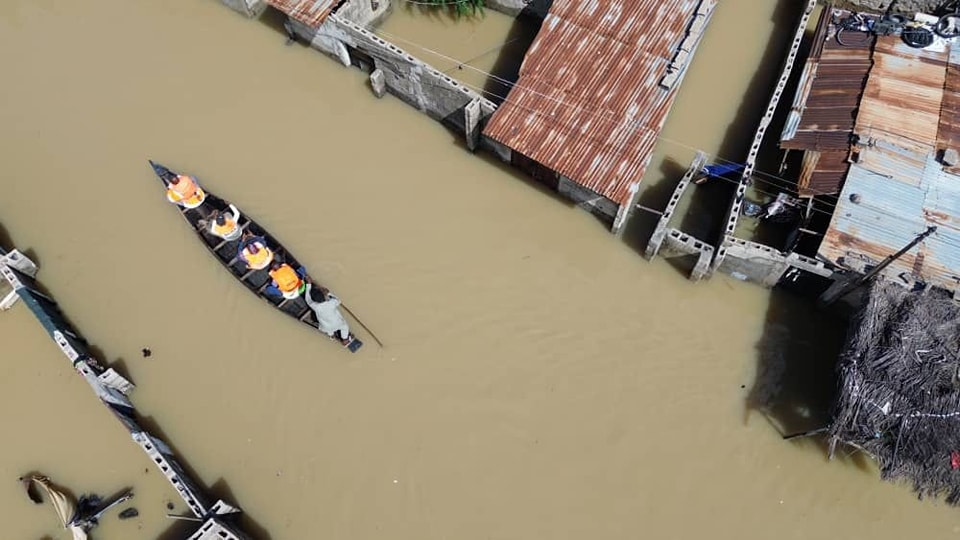
CDP has a Global Recovery Fund that provides an opportunity for donors to meet the ongoing and ever-expanding challenges presented by global crises.
Contact CDP
Philanthropic contributions
If you have questions about donating to the CDP Global Recovery Fund, need help with your disaster-giving strategy or want to share how you’re responding to this disaster, please contact development.
(Photo: Officials conduct assessment of the flood-affected areas in the Maiduguri Metropolitan Council and Jere Local Government Area of Borno State, Nigeria. Credit: National Emergency Management Agency Nigeria via Facebook.)
Recovery updates
If you are a responding NGO, please send updates on how you are working on recovery from this disaster to tanya.gulliver-garcia@disasterphilanthropy.org.
We welcome the republication of our content. Please credit the Center for Disaster Philanthropy.
More ways to help
CDP recommends that you ask the experts if you are considering supporting an organization or fund that is positioned to work in an affected area.
- CDP’s team is ready to help you with resources and support on responding to this disaster. You can find a variety of helpful resources on our website or reach out to one of the contacts above for more information.
- InterAction can provide resources and guidance about organizations working in affected communities.
- The Council on Foundations provides Country Notes for several countries to help foundations understand giving requirements, laws and regulations in various countries. Country notes for several African countries are available, including Nigeria.
Resources
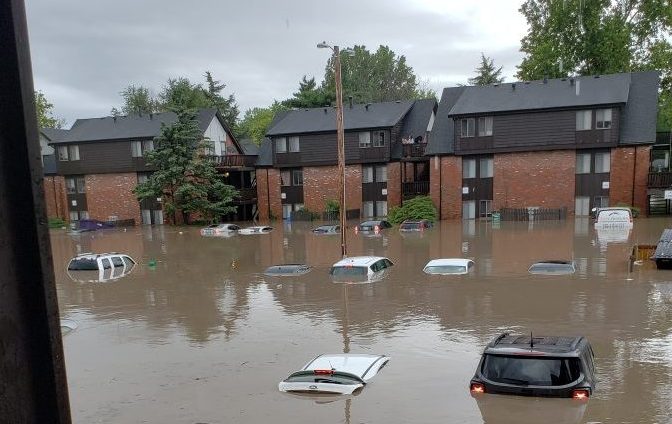
Floods
Flooding is our nation’s most common natural disaster. Regardless of whether a lake, river or ocean is actually in view, everyone is at some risk of flooding. Flash floods, tropical storms, increased urbanization and the failing of infrastructure such as dams and levees all play a part — and cause millions (sometimes billions) of dollars in damage across the U.S. each year.
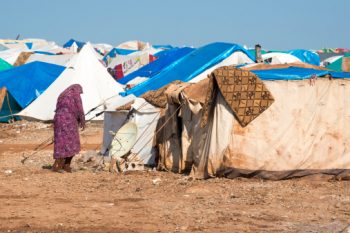
Emergency and Interim Shelter
After a disaster, shelter is more than a place to rest, it is a place of security, access to food, water and medical treatment. A place to start recovering after a disaster.
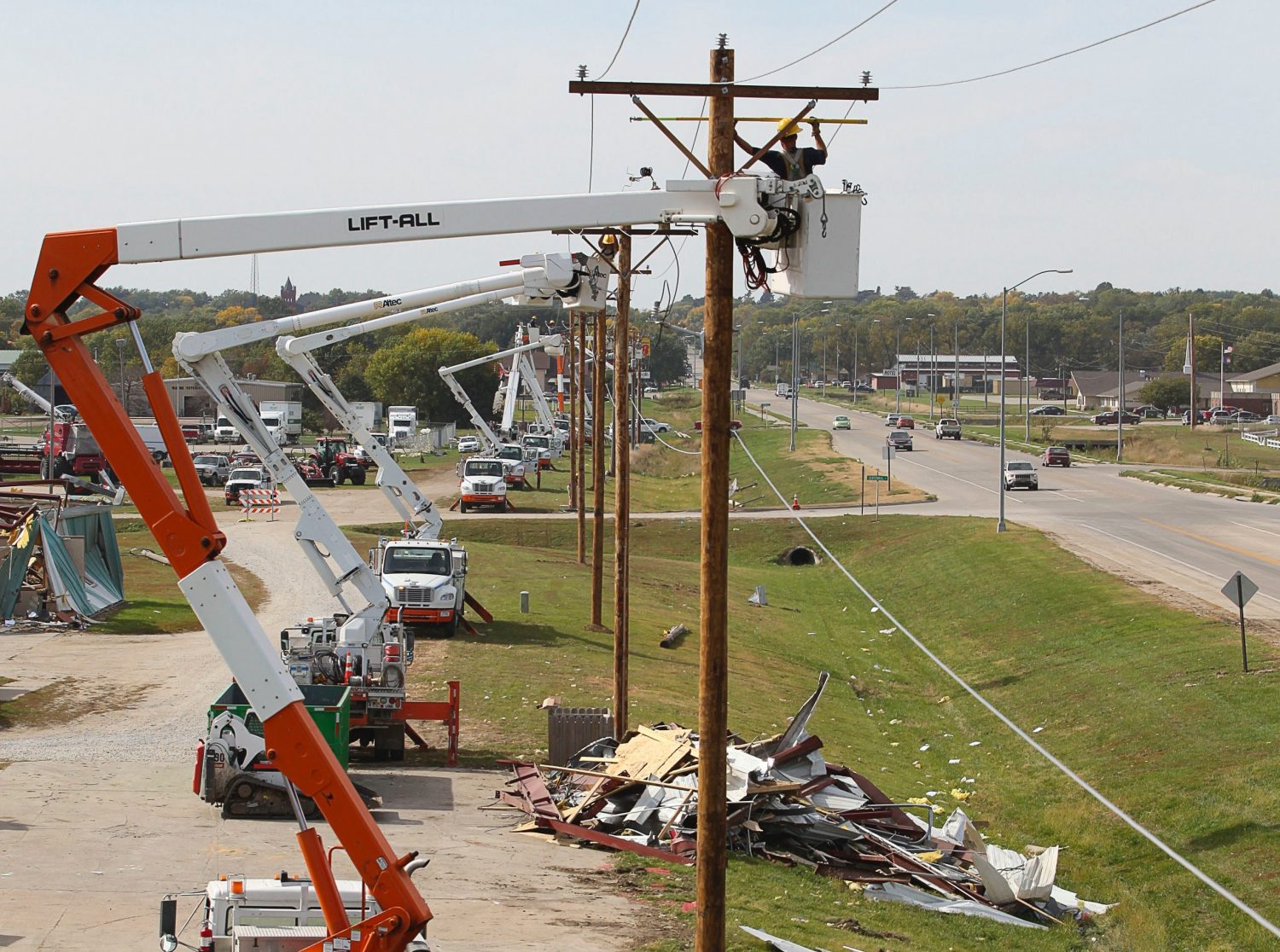
Critical Infrastructure and Systems
Critical Infrastructure and Systems (CIS) are the structures people rely on to perform their everyday tasks. They are what keep people, goods and information moving around the world while also keeping people safe and healthy.